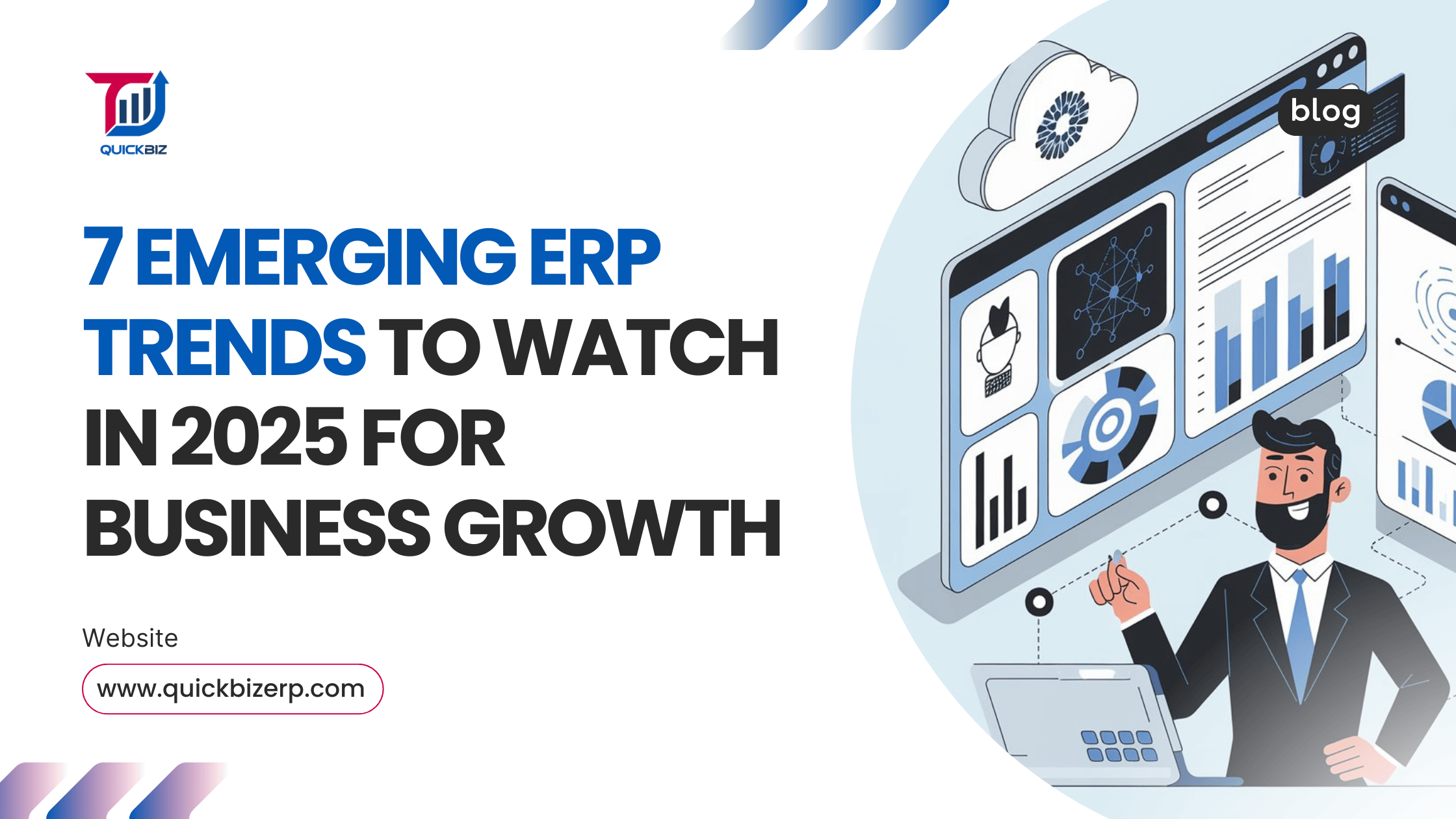7 Emerging ERP Trends to Watch in 2025 for Business Growth

Introduction
Enterprise Resource Planning (ERP) systems have become the cornerstone of modern business operations, enabling companies to streamline processes, improve efficiency, and foster innovation. As technology evolves at an unprecedented pace, ERP systems are no longer just tools for managing resources—theyre drivers of transformation and growth.
To stay competitive in 2025, businesses must embrace the emerging trends shaping the ERP landscape. From harnessing AI-driven analytics to integrating with IoT devices, these advancements offer immense potential for organizations to thrive in a fast-changing market. Let’s explore seven key ERP trends that are redefining how businesses operate and grow.
1. AI-Driven Analytics for Smarter Insights
Artificial Intelligence (AI) is revolutionizing ERP systems by delivering real-time analytics and actionable insights. AI-powered ERPs can process large volumes of data, identify patterns, and provide predictive analytics to guide decision-making.
Benefits:
- Enhanced Decision-Making: AI enables leaders to make data-backed decisions quickly and confidently. Learn how AI is revolutionizing ERP systems.
- Improved Forecasting: Predictive analytics offer accurate demand planning, inventory management, and financial projections.
- Process Automation: Routine tasks like data entry and report generation are automated, freeing up valuable time for employees.
By leveraging AI, businesses can turn raw data into strategic opportunities, gaining a significant edge over competitors.
2. Cloud-Based ERP Systems for Scalability
Cloud-based ERP solutions continue to dominate the market, offering flexibility and scalability for businesses of all sizes. These systems eliminate the need for costly on-premise infrastructure, making them more accessible and cost-effective.
Advantages:
- Cost Efficiency: Reduced upfront hardware costs and a subscription-based model lower financial barriers. Discover the top cloud-based ERP solutions.
- Remote Accessibility: Teams can access ERP systems from anywhere, supporting remote work and global operations.
- Seamless Updates: Cloud providers handle software updates, ensuring systems stay current with the latest features.
Cloud ERP systems are particularly beneficial for businesses planning to scale operations or adapt quickly to market changes.
3. Industry-Specific ERP Solutions
As businesses seek more tailored solutions, industry-specific ERP systems are gaining traction. These systems are designed to address the unique needs of particular industries, such as manufacturing, healthcare, retail, and logistics.
Benefits:
- Custom Fit: Pre-configured modules cater to industry-specific workflows and regulations.
- Streamlined Processes: Elimination of unnecessary features reduces complexity and enhances efficiency.
- Competitive Edge: Industry-focused features enable businesses to stay ahead in niche markets.
By adopting ERP systems aligned with their industry, companies can achieve better alignment between technology and business goals.
4. Enhanced Focus on User Experience (UX)
The modern workforce demands software that is not only powerful but also intuitive and easy to use. ERP providers are prioritizing user experience (UX) to make their systems more accessible to non-technical users.
Key Features:
- Intuitive Interfaces: Simplified dashboards and navigation improve user engagement.
- Comprehensive Training: Providers offer robust training programs to help teams maximize ERP benefits.
- Mobile Compatibility: Mobile-friendly ERP systems allow employees to work efficiently on the go.
A user-friendly ERP system enhances productivity and ensures smoother adoption across teams.
5. Integration with IoT and Smart Devices
The Internet of Things (IoT) is transforming ERP systems by enabling real-time data collection and connectivity with smart devices. IoT-integrated ERPs can monitor operations, track assets, and optimize workflows with unparalleled precision.
Use Cases:
- Manufacturing: IoT sensors track equipment performance, reducing downtime and maintenance costs.
- Logistics: Real-time tracking of shipments enhances supply chain efficiency.
- Retail: Smart inventory management systems ensure optimal stock levels.
IoT-enabled ERPs empower businesses to make data-driven decisions and achieve greater operational efficiency.
6. Sustainability and Green ERP Initiatives
Sustainability is becoming a priority for businesses, and ERP systems are evolving to support green initiatives. These systems help companies monitor and reduce their environmental impact.
Features:
- Energy Tracking: Monitor energy consumption to identify areas for improvement.
- Waste Management: Track and minimize waste across production and supply chains.
- Sustainability Reporting: Generate reports to demonstrate compliance with environmental regulations.
Adopting green ERP systems not only benefits the planet but also enhances a company’s brand reputation.
7. Cybersecurity Enhancements in ERP
As cyber threats grow increasingly sophisticated, ERP providers are investing in robust security measures to protect sensitive data.
Trends in Cybersecurity:
- Data Encryption: Ensures that sensitive information is protected during transmission and storage.
- Compliance Management: ERP systems help businesses meet regulatory requirements like GDPR or HIPAA.
- Disaster Recovery: Advanced backup and recovery solutions minimize downtime during breaches or failures.
A secure ERP system safeguards business continuity and builds trust with clients and stakeholders.
Conclusion
ERP systems are evolving rapidly, offering businesses new opportunities to innovate, optimize operations, and drive growth. By embracing these seven emerging trends—from AI-driven analytics to green ERP initiatives—organizations can stay ahead of the curve in 2025 and beyond.
Investing in the right ERP solution is no longer optional; it’s a strategic necessity for businesses aiming to thrive in a competitive landscape. Take the first step towards growth by exploring ERP solutions tailored to your industry and goals.

